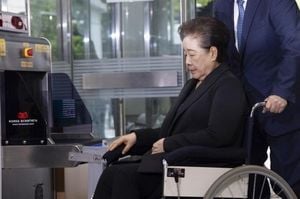Rutgers University has found itself at the heart of a heated campus free speech debate after a professor signed a petition calling for the removal of the school’s Turning Point USA (TPUSA) chapter. The controversy, which unfolded over the past week, has drawn national attention and highlighted the increasingly fraught climate surrounding political activism and academic freedom on American college campuses.
On October 10, 2025, Rutgers University publicly defended Professor Tia Kolbaba, an associate professor of religion, after she signed a Change.org petition that accuses TPUSA—a conservative student group—of “promoting hate speech and inciting violence against our community.” According to Fox News Digital, Kolbaba’s name appeared in the “Recent signers” carousel of the petition, which had been circulating online for several days. The petition’s existence and Kolbaba’s involvement were first reported by Fox News, which also noted that the full list of signatories is not publicly available due to Change.org’s privacy settings.
The petition’s timing has added fuel to an already volatile situation. Less than a month prior, Charlie Kirk, the founder of Turning Point USA, was assassinated during a campus event at Utah Valley University. Authorities have identified the alleged killer as Tyler Robinson, who reportedly left shell casings at the scene inscribed with the phrase “hey fascist, catch!” and other left-wing slogans. The shocking event has cast a shadow over conservative student activism nationwide, with many chapters expressing heightened concerns about safety and political hostility.
Rutgers University responded to the petition and the ensuing controversy by reaffirming its commitment to both safety and free expression. “Rutgers University is committed to providing a secure environment—to learn, teach, work and research, where all members of our community can share their opinions without fear of intimidation or harassment,” a university spokeswoman told Fox News Digital. She added, “Rutgers is committed to upholding the rights of students and faculty to free speech and academic freedom as fundamental to our community.” The university declined to comment further on specific personnel or student conduct issues.
Kolbaba herself did not respond to requests for comment. The petition she signed alleges that TPUSA’s presence on campus contributes to a climate of hate and violence. However, these claims have been met with strong pushback from TPUSA members at Rutgers.
Ava Kwan, the outreach coordinator for the Rutgers TPUSA chapter, condemned the petition in a statement to Fox News Digital. “The petition to disband our Turning Point chapter is blatantly defamatory,” Kwan said. “The accusations of ‘inciting violence’ and ‘making threats’ are complete lies. The same people claiming we’re suppressing their free speech are actively trying to silence us for speaking the truth. It’s not just ironic, it’s hypocritical and absurd.”
The dispute is not one-sided. In a move that further escalated tensions, the TPUSA chapter at Rutgers recently launched its own petition demanding the university fire Professor Mark Bray. Bray, who is known for his book Antifa: The Anti-Fascist Handbook, has been labeled “Dr. Antifa” by critics. The book openly advocates for “militant anti-fascism,” and Bray has stated that “at the very least 50 percent of author proceeds will go to the International Anti-Fascist Defense Fund which is administered by more than three hundred antifa from eighteen countries.” According to Fox News, Bray has also faced accusations of financially supporting Antifa operations.
Bray’s situation took a dramatic turn this week when he announced that he and his wife were fleeing to Spain after his address was doxxed and he received threats to his safety. The petition to remove TPUSA suggests that the group was responsible for cultivating threats and harassment that led to Bray’s decision to leave the country, a claim that Kwan and TPUSA categorically deny.
“Any opinion that challenges their worldview is immediately branded as ‘hate speech,’ a meaningless term weaponized to control dissent and protect their false narrative,” Kwan asserted. “The petition, Bray’s retreat abroad, and my own doxxing by unhinged Rutgers leftists all tell the same story: they know they’re losing.”
The university’s administration, meanwhile, has tried to walk a careful line—emphasizing the importance of open dialogue while refusing to take sides in the dispute. “The university does not comment on specific personnel or student conduct matters,” the spokeswoman reiterated, underscoring Rutgers’ desire to avoid inflaming the situation further.
This episode is just the latest in a series of high-profile clashes over free speech and ideological activism on college campuses. Across the country, conservative groups like TPUSA have argued that they are being unfairly targeted and silenced by left-leaning faculty and students. Meanwhile, critics of TPUSA contend that the group’s rhetoric and tactics cross the line from robust debate into harassment and intimidation.
The assassination of Charlie Kirk has only heightened these tensions, with both sides accusing the other of fostering an environment that encourages threats and violence. While law enforcement continues to investigate the Utah Valley University shooting, campus groups at Rutgers and elsewhere are left to grapple with the fallout.
For some, the events at Rutgers are a microcosm of broader national debates. The university’s public defense of Kolbaba’s right to sign the petition, even as it distances itself from the content of the petition itself, illustrates the complex balancing act facing academic institutions in 2025. They must protect the free speech rights of both faculty and students, even when those rights come into direct conflict.
At the same time, the dueling petitions—one calling for the disbandment of a conservative group, the other demanding the firing of a left-leaning professor—reflect a campus culture in which political disagreements are increasingly played out through public campaigns and social media, rather than face-to-face dialogue.
As the story continues to unfold, Rutgers finds itself in the spotlight, emblematic of the challenges facing universities nationwide. The administration’s commitment to “a secure environment” and “academic freedom” will almost certainly be tested again, as students and faculty navigate the treacherous waters of campus politics in an era marked by polarization and, at times, real danger.
For now, the debate at Rutgers serves as a stark reminder of just how high the stakes have become for free speech and safety in the modern American university.




